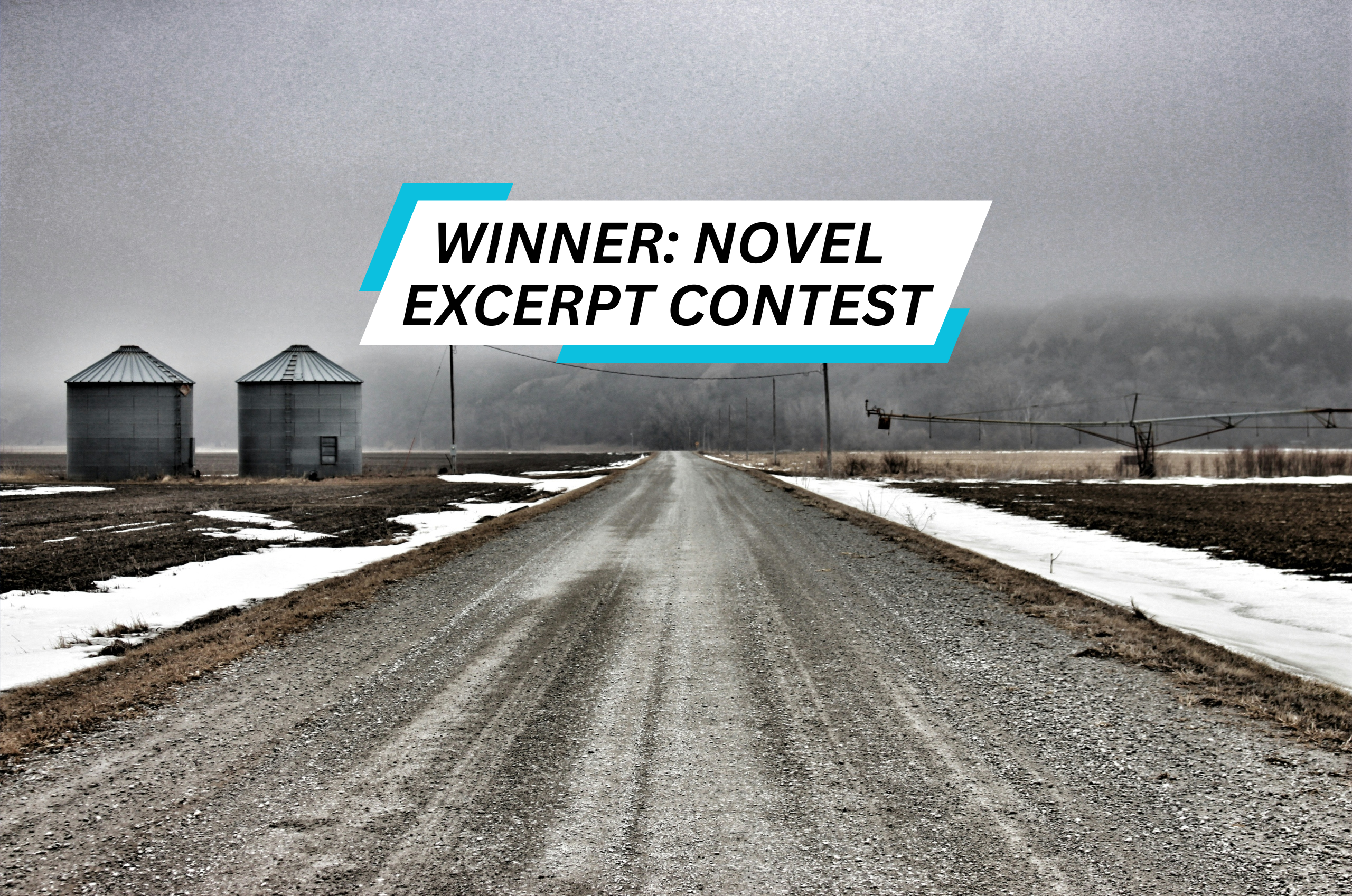Their men and boys were gone before they’d crossed into Nebraska. Teddy was the last to go. Mary never thought he would make it as long as he did due to his temper and his drinking. But he did. Then one night, he went out to take a piss while they were camped inside a decrepit motel on the outskirts of Des Moines. She’d tried to stop him. But he said in a rough voice he was going outside, that he was tired, so fucking tired, and that he just needed to take a leak, isn’t that okay? The look on his face horrified her more than anything. He’d been crying, his eyes red, matching his bulbous alcoholic’s nose. But the life was gone from his expression, the determination to continue completely drained. She stepped aside and let Teddy creep out the back door. Before he left, he turned to her and said he was sorry, that he wished them good luck. She watched him through a window as he walked into the darkness. When daylight returned, they didn’t find a body. They never did.
Now, their cacophonous truck finally gave out on I-80, a hundred miles west of what was once the state capital. First, the Ford pickup began to sputter, the needle far to the left empty. It continued for about half a mile, slowing to a crawl as it lost momentum on the flat, expansive plains of Nebraska. Mary didn’t even bother to pull it to the roadside. The vehicle shuddered and let out a final gasp, like a cancer patient in hospice, before coming to a stop. Nobody spoke as she put it in park in the middle of the two lanes. She got out, keys intentionally left jangling in the ignition. A thought: Someone, someday, might need the vehicle. Her hopeful nature impossible to completely snuff out, even after all that she had seen. After all, she had done.
They’d been lucky the last few hours, not having to weave between abandoned cars, hump it along the highway shoulder, or ride bikes like they did in that stretch near Davenport. The only vehicles they saw here were parked along the roadside, when others decided to walk when they, too, ran out of gas, thinking they would be safe.
Nobody knew then what would be coming.
The wind picked up as Mary walked to the truck’s rear, bringing with it the smell, the sickly rot that hung in the air. Almost overpowering their own stink. They hadn’t bathed for days. But even that didn’t matter too much. Her other senses were much more important.
Mary watched as the others grabbed their packs and weapons from the flatbed. Two girls and two women, none related. All that remained of the more than three dozen that set out a month ago. Mary hadn’t expected to get this far. But now they would need to walk. They’d be easy pickings when the sun fell if they didn’t find shelter.
Getting inside was all that mattered.
Mary was most concerned about Lilith, their youngest. Nine-years-old. Blonde pigtails. Freckles dotted her face like points of interest on a map not yet finished. They’d found her outside of Springfield, sitting by a side road near the interstate. She’d been crying, face still moist. She wore a backpack filled with food and clothes, in her tiny arms she clutched a stuffed iguana named Mr. Bubbles. Prepared. As if she were waiting for them to stroll by. When she saw their group, Lilith stood up, wiped off her face, and just joined them. She didn’t say anything for the first two days. The little girl communicated, nodding yes and no, but other than eating and drinking, her mouth stayed shut. She spoke a little more these days. Always hesitant. Like she knew her words were danger. Which they were, Mary guessed. Lilith cried almost every night, just like Mary once did at the start. Lilith cried less and less each day. You had to be thankful for small mercies.
Mary shuddered as Lilith put on her pack, thinking about everything the girl would miss. Nights spent staying up late, reading books, talking on the phone with friends. Sneaking out at night for a chance at her first kiss. Hell, even getting a driver’s license. But that’s why they were doing this. A chance at something resembling a normal life.
Lilith held a Sig Sauer, barrel pointed down, the way she’d been shown. The gun appeared enormous in the girl’s fragile hands, engulfing them. Mary hoped the girl would never have to use it.
Wordlessly, they helped one another tighten backpack straps before scouring the truck for anything else they’d need. But they had it all, they were just delaying the inevitable. An exit sign said a town called Doniphan was five miles away. Mary looked at the cloud-filled sky, trying to guess where the sun was. Nobody’s watches still worked. If they moved fast enough, she thought, they might be able to find shelter before nightfall.
If not . . .
She blinked hard and pushed the thought away.
###
Mary told the others in an upbeat voice they had more than enough time. The tone she perfected teaching all those undergrads and the occasional master’s student. Staying chipper was her main job now. Mary knew she was mostly trying to convince herself.
Mary gritted her teeth as she started toward the exit ramp with the others, the burdensome pack crushing her shoulders like hands from God pushing her toward the ground, the .308 Winchester heavy in her malnourished arms.
She saw the girl, then, to the east, in the seemingly never-ending distance of the plains. Mary thought it could potentially be a mirage, something about how the heat of the cracked interstate concrete affects the air. She’d heard about that once, how, on certain days, people in Indiana can see Chicago’s skyscrapers across Lake Michigan as if they’re glimmering off the water. The cool breeze pressing upon her pushed that thought out of her mind. No, not a mirage. The girl was there. Wearing a simple white dress, her long brown hair blowing in the wind, her pale skin not showing the same sunburns that Mary and her group had.
The girl was watching them. Probably had been for quite some time.
She looked hungry.
Mary knew no one else had noticed the girl. It wouldn’t matter if they did. Either way, they needed to walk. They needed to move. Night was coming. It always was.
###
They crossed the Platte River on a long two-lane concrete bridge that looked like it needed to be replaced decades ago. Mary once read, in a deep Wikipedia dive that took you far from your initial search, about how this river had started to dry up years ago. A mixture of climate change, severe drought, and agricultural overuse. The result destroyed farms and whole communities, upending a hundred and fifty years of tradition. But as she peered over the perilous edge now, the water churned underneath, flowing freely. Another unintended consequence of their current world.
They eventually passed a ranch. The house at first appeared promising before they got close and noticed the scorched wood, the place long ago set on fire. Mary chose not to wonder what would cause people to go that route. Horses and cows roamed within fences, their ribs visible. How the animals lasted this long was almost a miracle. Mary wanted to free them, give them more of a fighting chance, let them roam. But they didn’t have time. Maybe, she told herself, they could do it tomorrow. She knew that was a lie. One she’d repeated to herself countless times when they should’ve done the right thing and instead chose the easier path.
Thunder rolled in the distance. The sky to the west was growing darker, the clouds tumbling on themselves like an angry ocean. The wind had picked up, and the pressure swiftly changed. The approaching storm would be a strong one, Mary knew. If the truck had kept running, it would’ve only been about another hour to get to their final destination. Weeks and weeks of travel only to come up this short. Nothing ever went right. Maybe it never would again.
For the next half hour the only sound was their footsteps on pavement mixed with the occasional crunch when they moved onto gravel. They’d long ran out of idle chatter, knowing it was better to stay alert. While the night was the most harrowing, the daytime held different kinds of terrors.
Mary watched as the other two women kept their eyes always moving, rifles at the ready. Theresa had shaved her head again the night before. Sweat dripped off her brow, and the long vertical scar on her left cheek made her look somehow more vigilant. She’d gotten the cut long ago, before everything started. Just a freak lawnmower accident, she’d told them once. I wasn’t even using the damn thing, I was a block away. The thing left unsaid: lawnmower accidents were a thing of the past.
Theresa had been a part of their original group when they left their town in southern Illinois. Mary had seen the woman around, hard to miss because of the giant scar. Knew her that way you got to know people when you have the same general movements. Patterns matched. Occasionally, she’d see Theresa at the Coffee Hound near campus, sitting at a table, eating a pastry, and reading one of those doorstopper novels. More than once, Mary had wanted to walk over and introduce herself. Mary had never been good at making friends. A life in academia, constantly moving around, had led to that. She didn’t know if they were friends now. Mary didn’t think to ask.
Sam, the oldest in their group, appeared frail but was anything but. Mary had never asked the woman’s age, but she guessed late 60s. Sam kept her hair in a thick braid that went to her shoulder blades. Her husband disappeared the night before they left. Sam had never talked about it. None of them did when loved ones vanished like that.
The two women looked back at Mary from time to time, as if for assurance. She’d give them a slight head nod. As if that meant things were okay.
The other girl, Katrina, was 14, her red hair braided tight on her head, which Sam helped with. Still cared about appearances like that. She held a Remington semi-automatic shotgun, keeping the stock tight against her right shoulder. Her daddy had taken her hunting many times, raised her not to be afraid of weapons. The girl stared back at Mary now, a small smile on her face. Almost like this was an adventure to her. Mary thought the girl took too many risks. Like she didn’t care if she lived or died. She’d have to keep track of that.
In the distance, Mary saw a structure. Some kind of barn. Something with doors. A flood of relief rush through her. Shelter from the storm was one thing. Shelter from the night was all that mattered.
She didn’t know how it worked. But as long as you were surrounded by closed doors and windows, they couldn’t get you. Maybe they didn’t want to. Mary refused to theorize like the others.
Just as Mary was about to say something, the sky opened up without warning. Fat drops of rain crashed down, soaking them within seconds, like a bathtub was dumped on their heads. For a moment, they all stopped and looked up, almost relishing the cool effect of the shower.
A lightning strike crashed maybe twenty yards away, splitting a tree in two. It yanked them all out of their reverie. Mary yelled at everyone to run as the sky began to blacken and the wind picked up. Darkness was darkness, they’d learned the hard way. It didn’t matter if it came from the setting sun or if it was completely blotted out by a storm.
Darkness meant death would come for them all.
As she hurried toward the barn, the air felt like it was pulling on her, sucking her toward the storm. The pack’s straps dug into her shoulders as she tried to keep up with the others, her knees screaming from the added weight. She kept having to push her wet hair out of her eyes. Mary told herself that if they made it to tomorrow, she was cutting it all off. Theresa had the right idea. She’d push the others to do it, too.
The red sloped-roof building was about a football field long and half as wide with nine giant white garage doors along the western side facing a dirt lot. A now-shaking sign said M & H Concrete, almost ready to be torn out of the ground by the wind. Cars and trucks and semis were parked askew around it, some in various pieces of repair. Lilith had made it to the massive shed first and began yanking on doors, trying to open them. By the time Mary arrived, she could tell the entrances were all locked.
Looking back toward the road, in the distance, Mary saw the darkness completely blocking the sun. They needed to get inside immediately. They had only minutes.
Then, maybe a quarter mile away, amidst the pouring rain and lightning strikes, she the girl. Slowly walking toward them. She imagined the girl’s face, her mouth curled into a grin. Ready to feast.
Frantically, Mary looked around, thinking through options. The cars wouldn’t work. It needed to be a structure. She cupped a hand above her eyes, trying to prevent the pouring rain from blinding her. On the roof: a small access hatch. She scanned the area. There! Next to the building. A semi-truck. Parked close. The height of the cab might be tall enough to get onto the roof. It had to be.
As she moved the group toward the vehicle, she prayed that the roof hatch wasn’t locked.
One by one, she helped them on the hood of the semi, starting with the younger two and working up to Theresa, who needed the most help. They each almost slipped a half dozen times as they climbed onto the cab’s roof before stepping onto the building. Mary was the last one to crawl up, almost unable to find purchase without someone behind her giving her a boost. But she made it, just barely, after throwing her pack up first and scrambling up with just the rifle slung across her back.
As Mary stepped onto the building’s roof, she saw the girl only a few hundred yards away now. She was walking faster, picking up pace as she got closer. Bile grew at the back of Mary’s throat, and she pushed it down.
Mary moved quickly toward the hatch, trying not to slip on the corrugated metal roofing.
“Open it!” she yelled at them as they stood around the hatch.
“It’s locked,” said Theresa, yanking on it, her voice frantic. “I fucking can’t!”
Mary rustled with the hatch, willing it to open. Then she pulled out her rifle, aimed where she thought the lock inside might be, and fired. The sound momentarily deafened her hearing, and she shook the hatch. Didn’t budge. She emptied the rifle’s chamber and fired again, knowing she only had three more rounds. The second shot didn’t work either. Anger welled inside her. This would be her fault. This was her plan. She was their leader. She was letting them all down.
She saw the girl’s head peaking over the side of the building. A blonde, deathly pale skin. She was standing on the semi. The girl looked directly at Mary. Even in the rain and strong wind, her eyes didn’t blink. Her mouth was pulled back in a snarl. Teeth visible.
The third bullet did it. The hatch easily lifted open. A catwalk hung underneath. Mary helped each one inside as fast as possible, knowing every extra second they took meant another step by the girl.
As she lowered herself into the building and right before shutting the hatch, she saw the girl on the roof, about five paces away.
Even through the rain, Mary could tell the girl was laughing.
###
Before
Mary walked into the college classroom, already a bundle of stress. The wall clock said 9:08 a.m. She was never late. It was one of those things she prided herself on. Mary Walker was an on-time person. She may have married a we can be a little late person, but she’d managed to turn Zeke around. It may have only taken five years, but still.
“Sorry, sorry,” she told the students chattering behind her as she set her bag down by the blackboard at the front of the lecture hall. “Had a bit of trouble getting to campus today.”
The abandoned cars had slowed her drive to work. The ride normally took less than ten minutes, including finding parking in one of the employee lots. But the ever-hated tow trucks were out, making their big bucks, trying to get the vehicles off main roads, which seemed to cause even more traffic. Horns honked as Mary’s Prius sat unmoving, wishing she’d left her house even sooner.
When she finally decided to take side streets, Mary had passed one car on the way in that looked just like the banana yellow PT Cruiser owned by the widower Carl three houses down from her. It was in the middle of Elm Street, door still open. As Mary drove past, she eyed it curiously. Who just leaves a car like that?
As she took off her jacket, Mary turned toward the classroom, putting on her best professorial smile. It faltered after she scanned her audience. Her Tuesday morning psychology lecture normally had about sixty students. Today’s class appeared half full. If that.
“Where is everyone?” she asked. “Did they leave? You know, you’re supposed to give professors with doctorates fifteen minutes of grace.” She smiled, using her positive professor voice. “I mean, that was the rule when I was a student, at least.”
Tiffani Shin, her graduate TA, was sitting in the front row and shook her head. “Nobody’s left since I got here.”
Mary finished removing her jacket and threw it on the lectern. “Nobody?”
“Nobody.”
Just a bit concerning. Mary shook it off. “Well. I appreciate everyone who showed up.”
“Maybe they’re among The Vanished,” said a male voice from the back.
The Vanished. The phrase made Mary squirm. She’d made her husband stop using it when it entered his vocabulary a few months back. It was silly. Sounded like a bad TV drama from the early 2000s. Like that show with those people from the plane crash stuck on the island. Spend six seasons, and it all doesn’t mean anything? Not Mary’s style.
Mary cupped a hand over her eyes and squinted. The voice belonged to Jeremy Miller. Of course, it did. He’d been a thorn in her side all semester. Deeply religious. Always taking issue with what she was teaching. Mary had one like him almost every semester, a student who refused to engage with what they were being taught. Disagreeable about everything, answering questions incorrectly on purpose on exams because it went against their beliefs. She didn’t care about your beliefs. You just had to answer the damn test questions properly.
She chose to ignore his comment. “Did everyone do the reading? Because we’ve got a lot to dive into today and—”
“Just because you don’t believe in it doesn’t mean it isn’t happening,” Jeremy said.
He stood up and walked down the lecture hall steps, getting a closer seat. The other students looked at him, then at Mary. She knew she needed to gain control of the classroom, or this could spiral.
“Jeremy, we can talk about this after class, but right now—”
“Don’t you have anything to say about this? Doesn’t what’s happening out there have something to do with your alleged area of expertise?” he said, pausing. “Or do you just not have an answer?”
Mary opened her mouth to speak but paused. She didn’t think this was helpful to discuss. Everyone was going on and on about this. The newspapers. The television. The internet. She felt her students’ eyes on her.
It had started maybe six months ago. Strange reports of kidnappings. At least, that’s what they were first called. People who just disappeared. It took a while for the media to catch on. Then, the podcasts, those true crime experts, put together what they thought were the pieces without any care for the lives they trampled on. Only happening to men and only at night.
Fox News said it was clearly men who’d gotten fed up with the wimpification of society and quit their lives and just moved elsewhere. MSNBC said it was an elaborate hoax to fuel the woman-hating agenda on the right. CNN tried to find a centrist position, making everyone think they were stupid.
It was only in the last few weeks that more people started allegedly disappearing. Famous people. Hosts of some of those opinion-head shows on cable networks. And if social media was accurate—and Mary honestly didn’t think that could be the case, how could it be?—others were starting to disappear, too.
She gripped the podium and took a breath.
“No, I don’t have an answer,” she said. “And neither do all the other people who are pretending like they do. If you want my opinion, I think a lot of people are just vying for attention. Using the virality of the internet to turn these disappearances into modern-day folk stories. Stringing things together. Pattern recognition. It’s what we do, looking for things that aren’t there. Nothing more. Now, we’ve got a lot to cover, and I’d appreciate it if—”
“My parents,” Jeremy said. He opened his mouth to say more, but it was like he was stuck.
“Ah,” she said, feeling a bit of smugness. “Are your parents the ones who filled your head with this nonsense?”
He didn’t answer at first. When he did, his voice was almost a whisper. “They’re gone.”
Mary felt a pang in her chest. She asked, “What do you mean?” But judging by the look on his face, she already knew the answer.
Jeremy stood up. It was then she noticed how disheveled he looked. His normally combed auburn hair looked like a bird’s nest. He had a lot of stubble, even for a college senior. Dark rings under his eyes, like he was auditioning for a goth band. And his clothes looked wrinkled. Like he’d slept in them.
“I mean, they didn’t come home last night. The cops don’t know anything. Their phones just ring and ring and ring. They just vanished.”
###
“The chief’s gone,” her husband Zeke said when he entered the kitchen from the garage. She checked the time: He was a bit earlier than usual. Usually, Zeke would go for a run after work and pull into the garage shortly after sundown. The sun still shone as it hovered near the horizon.
“They finally fired him?” Mary asked.
Zeke sat down at the dinner table across from Mary, various student papers strewn out in front of her. He reached over and rubbed her arm.
“No,” Zeke said. “He’s gone. Gone gone.”
Mary sighed. “Jesus Christ, everyone’s just going bonkers.”
“Mary, it’s—”
She pushed back her chair and got up, moving to the fridge. She needed a beer. Mary opened the door and looked inside. She pulled out two, the local craft ones Zeke knew she liked, and gestured one bottle toward him, asking with her eyes, want one?
He nodded, and she popped off the bottle cap on their countertop, slamming it with her hand. She’d done it at the party they’d met at years ago, back when she was still just a lowly master’s student, and he was attending college on the GI bill after his stint in the Marines. The move had made him come over to her immediately, wanting to know what a clearly smart, sophisticated woman was all about. They were married ten months later.
She handed him the beer, and he immediately took a long drag.
“They want me to be acting chief,” he said when she finished.
“That hard up for help?” she asked as she sat down. She hit his arm playfully, and he smiled lightly.
“The mayor’s thinking of enacting a curfew. Sundown to sunup.”
“That’s insane.”
He took another deep swig from his bottle. “It may be. But you’re not going outside when it’s dark. Okay?”
“I’ll do what I want, thank you very much.”
“No, you won’t. Not when it’s dark out.”
A swell of anger rose inside her. Zeke may have some cro-mag tendencies. You don’t leave the service and lose all of that macho swagger. Once a Marine, always a Marine, she’d heard him say countless times. But he never talked to her like this. Not once.
Mary kept her voice calm. “Zeke, honey. Dearest. I say this with all due respect, but you don’t get to tell me what to do.”
“And I never have, have I?” he said. “Right?”
“No,” she admitted. “You don’t. I can tell you want to sometimes.”
“Yeah. Sometimes. Sure. But I don’t. I haven’t.” He was quiet for a moment, choosing his words. “So maybe it means something when I’m telling you I don’t think it’s safe outside at night. And I don’t want you outside when it’s dark. So you’re not going outside when it’s dark. Okay?”
This wasn’t coming from a place of possession, or of anger, or some self-righteous male domination bullshit she’d had to deal with so many men in her life. Zeke had always been different. That’s why she married him instead of the natural choice, a fellow dorky academic.
No, Mary could tell this came from a place of respect. Of love.
Of fear.
Mary reached across the table and squeezed his hand. “Okay,” she said. “I was going to put on my superhero costume, fight crime, do all that stuff I normally do.”
“Right.”
“Instead, I’ll stay at home. Doors closed and locked.”
“Thanks,” he said. “I appreciate that.”
“You better, chief.”
“Acting chief,” he said.
“Well, why don’t you act like the chief and make me some dinner?”
“Oh, so you get to tell me what to do?” he said as he pushed back his chair, taking his beer with him to the kitchen.
“Correct,” she said. “When it comes to culinary matters.”
She slept restlessly that night. Before bed, they’d tried watching the news, but it was all the same. Stories about people who seemed to have disappeared and how that was impacting things. The speaker of the house hadn’t shown up for some important procedural vote that day, which meant Congress would remain in limbo for a few more days without him. Some aging singer had his tour dates canceled because they couldn’t find him after a recent show in Cleveland. A YouTuber hadn’t posted anything in a week, which led to his fans posting all sorts of strange conspiracy theories.
The stories ran in Mary’s head as she rolled over, trying to push them away. What if something was happening? Isn’t it the people in the movies who make the leap to the fantastical first who end up surviving?
But this isn’t a movie, she reminded herself as she heard Zeke lightly snoring next to her. She reached over, patted the covers over his chest. This was her life.
She fell asleep at some point, unsure when. A repetitious noise outside woke her up, a repeated clanging. It wasn’t consistent, which made it even more impossible to ignore. She opened her eyes and saw Zeke was still snoozing. It was a little after 4 a.m. The sound kept happening, causing her to wince each time.
Mary moved to their bedroom window, looking out toward the street. The lamps lighted the area in an orange glow. No movement that she could see. She heard the sound again, realized it was coming from next door. She walked to the window facing their neighbors. The Bishops. Married couple, about the same age as her and Zeke. They had two daughters.
Through the faint glow of the streetlight she noticed an upstairs window open. Next to it, one of the decorative wooden shutters had come loose. It was banging back and forth against the wind. She peered over the rest of the house. The lights were off. Nothing out of the ordinary. Mary wanted to call, to complain about the shutter. But that would be rude at this hour. Not very neighborly.
She grabbed some headphones, put on some white noise, and went back to sleep.
###
By the time she finished drinking her morning coffee, Zeke was about to leave for work. Full uniform. That was new. He normally wore a suit and tie as a captain, most of his work in office and administrative. Then she remembered: acting chief. Zeke gave her a quick kiss and said he’d be back before sundown, the underlying subtext being and so should you. She smacked his ass as he walked past, a strong grin on her face.
On Wednesdays, she didn’t have classes until the afternoon, so she took her time that morning to finish grading papers on the kitchen table before taking a shower. As she dried her hair, she looked out the bathroom window, which faced the Bishops’ house.
The side door was open. Shit. Maybe one of the kids had left it like that before going to school.




